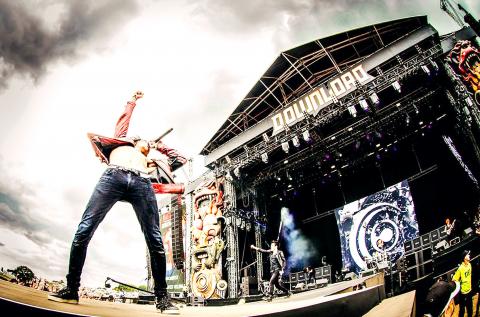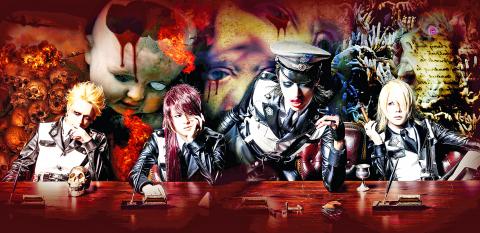Metalcore is a niche genre, and one I don’t usually follow. But over the last three years, there has been a consistent buzz about an Osaka metalcore band called Crossfaith, and it’s been coming from across the board. Goth kids at raves, concert photographers, promoters and even general fans of Japanese rock have all been saying the same thing, “You have got to see this band!”
Next weekend, we’ll get a chance. Crossfaith will visit Taiwan for the Heart Town Festival in Greater Taichung, an outdoor festival that features around 60 bands on four stages from Aug. 9 to Aug. 10. The flavor will be mainly metal and hardcore, especially with the dozen or so international bands, including Crossfaith, Coldrain, SiM, Rottengraffty and Hatake from Japan, Born of Osiris, Finch and While She Sleeps from the UK, US bands Issues and Architects and around 50 other bands from Taiwan and Southeast Asia.
“We looked at the other festivals already happening in Taiwan, and we wanted to differentiate ourselves,” says Heart Town Festival organizer and self-avowed metalhead Jimmy Liu (劉鈞輝). “Then we ended up with this lineup, which is really metal. Crossfaith was the first band we booked, and it all kind of flowed from there.”

Photo Courtesy of Julen Photo and Heart Town Festival
Crossfaith is young, with the oldest band member 26 and the youngest 23, and things are happening for them extremely fast. The first time they got the chance to play a big concert stage was in 2009 at Loud Park, Japan’s biggest showcase for metal, which that year also featured Judas Priest, Slayer and Megadeth.
“Before the show, there were only 50 people in front of the stage,” recalls bass player Hiroki Ikegawa, speaking via Skype from New Jersey, where the band was in the studio recording.
“But then we started playing, and suddenly there were 3,000!”

Photo Courtesy of Julen Photo and Heart Town Festival
Three years later in 2012, they got their first chance to play internationally, touring the UK with Of Mice and Men. At that point, “We couldn’t even speak English,” recalls Ikegawa, who says he has since learned English by watching the animated comedy Southpark. “We were just used to touring Japan, which basically consisted of three shows — Tokyo, Osaka and Nagoya. But there we played 17 shows in 17 days. We were learning very quickly what it means to be a band.”
In Japan, Crossfaith’s last album, Apocalyze (2013), hit number one on the Tower Records chart and number 13 on Oricon, the chart for all music sales in Japan. Unique for international metal, though not for Japan, their music is a mix of screamo hardcore and techno beats, which play around the edges of most songs, even underpinning some as the major driving force. They write songs about partying (Jaegerbomb), high school (Countdown to Hell) and the Fukushima nuclear disaster (Only the Wise Can Control Our Eyes).
“If there is one band we really look up to, it is Prodigy, because their live show is totally insane” says Ikegawa, who also counters that Prodigy is not necessarily a template.
“We just really respect them for their energy. For us, we are trying to find a balance between rock and electronics. But we are coming more from the side of metalcore.”
The band formed while in junior high school, though lead singer Ken (Kenta Koie) and the main composer and DJ, Teru (Tamano Terafumi), had been friends since elementary school. With the addition of guitarist Takemura Kazuki, Crossfaith officially formed in 2006. Still all in high school, they began to make their way in Osaka’s legendary hardcore scene. Ikegawa joined two years later.
“Osaka is really different from Tokyo,” says Ikegawa. “It’s not such an international city, and there is more poverty and social problems. And that weird scene is giving inspiration to all the hardcore bands.”
Since bridging to an international audience, Crossfaith has begun meeting their idols of their not-so-distant high school days. Last summer they were invited to a barbecue by Metallica, while playing the Soundwave Festival in Sydney, Australia.
“We met Metallica’s lead singer, James Hetfield, and I was really surprised that he knew of our band,” says Ikegawa. They also got to meet James Iha from the Smashing Pumpkins and Tom Delonge from Blink 182. “It was so crazy for me. I was a little nervous,” he recalls.
But on stage, nervousness is not an issue. “Onstage, the energy is just incredible,” says Julen Esteban-Pretel, a photographer who toured with them last year through the UK. “Back stage they are actually pretty low key, but the minute they go on stage, they just go crazy.”
■ The Heart Town Festival (山海屯音樂節), Aug. 9 to Aug. 10 at 362, Fuxing Rd, Sec 3, Greater Taichung (台中市復興路三段362號). Advance tickets are NT$2,000 for single day or NT$2,800 for two-day pass. Available through iBon or on indievox.com.

April 28 to May 4 During the Japanese colonial era, a city’s “first” high school typically served Japanese students, while Taiwanese attended the “second” high school. Only in Taichung was this reversed. That’s because when Taichung First High School opened its doors on May 1, 1915 to serve Taiwanese students who were previously barred from secondary education, it was the only high school in town. Former principal Hideo Azukisawa threatened to quit when the government in 1922 attempted to transfer the “first” designation to a new local high school for Japanese students, leading to this unusual situation. Prior to the Taichung First

Chinese Nationalist Party (KMT) Chairman Eric Chu (朱立倫) hatched a bold plan to charge forward and seize the initiative when he held a protest in front of the Taipei City Prosecutors’ Office. Though risky, because illegal, its success would help tackle at least six problems facing both himself and the KMT. What he did not see coming was Taipei Mayor Chiang Wan-an (將萬安) tripping him up out of the gate. In spite of Chu being the most consequential and successful KMT chairman since the early 2010s — arguably saving the party from financial ruin and restoring its electoral viability —

The Ministry of Education last month proposed a nationwide ban on mobile devices in schools, aiming to curb concerns over student phone addiction. Under the revised regulation, which will take effect in August, teachers and schools will be required to collect mobile devices — including phones, laptops and wearables devices — for safekeeping during school hours, unless they are being used for educational purposes. For Chang Fong-ching (張鳳琴), the ban will have a positive impact. “It’s a good move,” says the professor in the department of

Article 2 of the Additional Articles of the Constitution of the Republic of China (中華民國憲法增修條文) stipulates that upon a vote of no confidence in the premier, the president can dissolve the legislature within 10 days. If the legislature is dissolved, a new legislative election must be held within 60 days, and the legislators’ terms will then be reckoned from that election. Two weeks ago Taipei Mayor Chiang Wan-an (蔣萬安) of the Chinese Nationalist Party (KMT) proposed that the legislature hold a vote of no confidence in the premier and dare the president to dissolve the legislature. The legislature is currently controlled